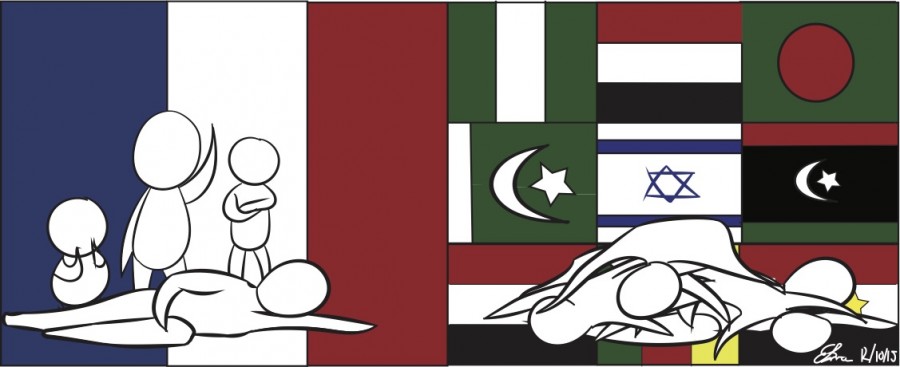West mourned, East ignored
Paris terrorist attacks distract the world from other violence.
December 10, 2015
“It is not Paris we should pray for. It is the world. It is a world in which Beirut, reeling from bombings two days before Paris, is not covered in the press,” Instagram user Karuna Parikh posted a day after terrorist attacks shook the City of Light, causing the world to mourn.
A double suicide bombing in Beirut, Lebanon, Lebanon killed at least 43 people one day before the attacks on Paris. Other suicide and roadside bombings staggered Baghdad, Iraq — killing 23 people and wounding dozens on the same day as the Paris attacks. The self-proclaimed Islamic State, ISIS, claimed responsibility for both attacks.
A death count in Potiskum, Nigeria included at least 46 students who lost their lives at the hands of a suicide bomber affiliated with Boko Haram, another radical Islamic terrorist group presiding in Nigeria.
French flags draped over Facebook profile photos in solidarity with the victims of Paris while Lebanon, Iraq and Nigeria were merely passè topics mentioned on news outlets and promptly forgotten.
“When my people died, no country bothered to light up its landmarks in the colors of their flag,” Elie Fares, a Lebanese doctor, wrote on his blog. “When my people died, they did not send the world into mourning. Their death was but an irrelevant fleck along the international news cycle, something that happens in those parts of the world.”
The comparisons do not end there. A husband and wife orchestrated a shooting at a San Bernardino, California developmental disability center, leaving 14 victims lifeless. The tragedy was broadcasted on full blast by major media outlets while a triple suicide bombing that killed at least 27 people in N’Djamena, Chad four days later was only briefly covered in comparison.
We mourn victims of violence selectively. Western countries also garner more sympathy, because they are developed nations who are unfamiliar to the morbidity of massacres and terrorist attacks that are seen as the norm in certain African and Middle Eastern nations.
Our world mentality has become faulty. If a person is exposed to the same subject again and again, it loses its relevance. Paris was a different variation of the same events that take place in the Middle East and Africa nearly everyday. International media only seemed to glorify the attacks on Paris since a western country attacked by terrorism deemed itself as “different.”
The tragedy in Paris should not be diminished, but 17,000 lives taken by Boko Haram since 2009 and a total loss of 17,049 Iraqi civilian lives in 2014 at the hands of ISIS should not be pushed under the rug simply because “it happens all the time.”
The life of an innocent Parisian or Californian is not more valuable than the life of an innocent Nigerian, Iraqi, Lebanese or Chadian. When we value one culture over another, we cease our mindfulness on how disturbing this action is.
As we concentrate on the Parisian tragedy, we need to be careful not to blind ourselves to the primary and presently consistent victims of terrorism: the victims in a world that we find so detached from our own when, in reality, we all walk on the same planet.










